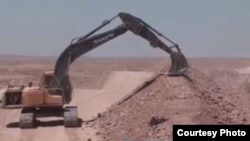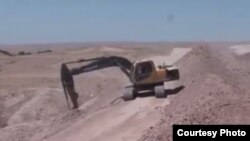The Shi’ite-led Iraqi government has started constructing a giant wall around Baghdad that it says will prevent militant attacks and reduce the large number of checkpoints inside the city.
But Sunnis and Kurds worry it is a politically motivated attempt to isolate the capital from the Sunni areas.
The Iraqi Interior Ministry's police spokesman, Brig. Gen. Saad Maan, told the Associated Press last week that work began on a 105 kilometer stretch on the northern and northwestern approaches of the capital — about 32 kilometers from the city center.
Maan said the wall will be three meters high and partially made up of concrete barriers already in use across much of the capital.
The partitions will dramatically improve security and reduce the number of checkpoints inside the city by 50 percent within six months, the government said. Baghdad has been a target of numerous sectarian and terror-related bombings since the U.S.-led intervention in 2003.
Separating Sunnis
But Sunni and Kurdish leaders see the wall as an attempt toward “demographic changes” favoring Shi’ite interests in the capital.
Mohammed al-Karbouli, a Sunni MP and a member of the Parliamentary Committee on Security and Defense, told VOA that the project is an attempt to isolate Sunni tribal areas from the capital.
“The majority of the areas surrounding Baghdad belong to Sunni tribes,” he said. “This wall will separate a brother from a brother. This is why we are worried.”
Karbouli said he was concerned that the Shi’ite militia known as Popular Mobilization Forces (PMF) would make demographic changes in the Sunni areas surrounding the capital after it recaptured them from the Islamic State (IS) occupiers.
“We have experienced that any area captured by [PMF] will be seized and not given back to its rightful owners,” Karbouli said.
Retaliating against Kurd
Jamal Kochar, a Kurdish MP, asked the Iraqi government to release “objectives” behind the building of the wall.
Kochar fears that the Iraqi government is retaliating against Kurds who have begun digging trenches in northern Iraq.
Kurdish officials say the trenches are to strengthen their defense line against IS. But the Iraqi government accused the Kurds of attempting to set up a de-facto Kurdish border as part of a process toward independence.
“When we started digging a trench in the frontline against IS, they [Iraqi government] accused us of separating from Iraq,” Kochar said. “Today they are building a wall around the capital.”
But MP Ahmed al-Badri of the National Alliance (a Shiite) rejected the concerns and described the decision to build the wall as “moving toward the right direction.”
“Killing, kidnapping, and explosions have increased in Baghdad recently,” he told VOA. “The security forces concluded that building a wall was a realistic and effective way to improve security and to prevent terrorist groups from entering the city.”
“Baghdad is the capital of all Iraqis and no wall or fence will isolate the city or prevent citizens from entering it,” the Iraqi government said in a statement, aimed at being reassuring. “It is our responsibility to protect all residents of the capital from the criminal acts of terrorist organizations.”





